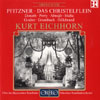Pfitzner Das Christ-Elflein
View record and artist detailsRecord and Artist Details
Composer or Director: Hans (Erich) Pfitzner
Genre:
Opera
Label: Orfeo d'or
Magazine Review Date: 6/2001
Media Format: CD or Download
Media Runtime: 101
Mastering:
ADD
Catalogue Number: C437992I

Tracks:
| Composition | Artist Credit |
|---|---|
| (Das) Christ-Elflein |
Hans (Erich) Pfitzner, Composer
Alexander Malta, Tannengreis, Bass Bavarian Radio Chorus Claes-Håkan Ahnsjö, Frieder Gumpach, Tenor Ferry Gruber, Jochen, Tenor Hans (Erich) Pfitzner, Composer Helen Donath, Elflein, Soprano Janet Perry, Christkindchen, Soprano Kurt Eichhorn, Conductor Munich Radio Orchestra Nikolaus Hillebrand, Ruprecht, Bass Paul Hansen, Herr von Gumpach, Baritone Raimund Grumbach, Franz, Bass |
Author:
The Christmas-Elf: A Christmas Fairy Story began its public life in 1906 as a play by Ilse von Stach, with incidental music by Hans Pfitzner, then 37 years old with Der arme Heinrich and Die Rose vom Liebesgarten behind him and Palestrina before. The composer later developed the musical ideas of his score into a Spieloper, the familiar form of entertainment much the same as Singspiel and akin to opera comique, in which the musical numbers are linked by spoken dialogue. This had its premiere in 1917, conducted by Fritz Reiner, with a cast which included the young Elisabeth Rethberg as the Christ-child. The recording substitutes a narrator for the speaking-voices of the characters. This needs spelling out in plain English, as otherwise the plain-English listener may wonder exactly what is going on and, indeed, will to some extent still be guessing, as the booklet supplies no text, giving a synopsis of the narration but only the most scanty summary of the passages actually sung.
The story, a mixture of fantasy and sentiment, makes a promising start. We meet the Elf, who has never heard of Christmas, and the old Fir Tree who has and doesn’t like it (firs get chopped down to make Christmas trees). Then, I’m afraid, there comes a dying child, whose death scene is mercifully spared us because the Elf volunteers to go to heaven in her place. The Overture attractively prepares the mood and sets the scene for a richly Germanic children’s opera in the manner of Hansel und Gretel. It hardly lives up to such expectations, but contains music that is often delightful and never less than worth hearing. Dramatically, it is much enfeebled by continually having to stop for the narration, and musically it has a weakness of its period in not seeming to know when (and sometimes how) to stop.
Given the conditions of its use of narrator, the performance serves it well. The orchestral playing is fine, which is what matters most, since the orchestra is its real protagonist. The singers do well with such opportunities as they are given: Helen Donath is aptly cast and Alexander Malta is a splendidly deep-rooted and sonorous Fir Tree. The booklet contains a good general note on Pfitzner and his work, but cries out for more help in following the action. As usual, the sound has been technically well cared for. I imagine the hero of the occasion is Kurt Eichhorn, who has for this music the sure feeling that accrues from a lifetime spent in the tradition
The story, a mixture of fantasy and sentiment, makes a promising start. We meet the Elf, who has never heard of Christmas, and the old Fir Tree who has and doesn’t like it (firs get chopped down to make Christmas trees). Then, I’m afraid, there comes a dying child, whose death scene is mercifully spared us because the Elf volunteers to go to heaven in her place. The Overture attractively prepares the mood and sets the scene for a richly Germanic children’s opera in the manner of Hansel und Gretel. It hardly lives up to such expectations, but contains music that is often delightful and never less than worth hearing. Dramatically, it is much enfeebled by continually having to stop for the narration, and musically it has a weakness of its period in not seeming to know when (and sometimes how) to stop.
Given the conditions of its use of narrator, the performance serves it well. The orchestral playing is fine, which is what matters most, since the orchestra is its real protagonist. The singers do well with such opportunities as they are given: Helen Donath is aptly cast and Alexander Malta is a splendidly deep-rooted and sonorous Fir Tree. The booklet contains a good general note on Pfitzner and his work, but cries out for more help in following the action. As usual, the sound has been technically well cared for. I imagine the hero of the occasion is Kurt Eichhorn, who has for this music the sure feeling that accrues from a lifetime spent in the tradition
Discover the world's largest classical music catalogue with Presto Music.

Gramophone Digital Club
- Digital Edition
- Digital Archive
- Reviews Database
- Full website access
From £8.75 / month
Subscribe
Gramophone Full Club
- Print Edition
- Digital Edition
- Digital Archive
- Reviews Database
- Full website access
From £11.00 / month
Subscribe
If you are a library, university or other organisation that would be interested in an institutional subscription to Gramophone please click here for further information.





